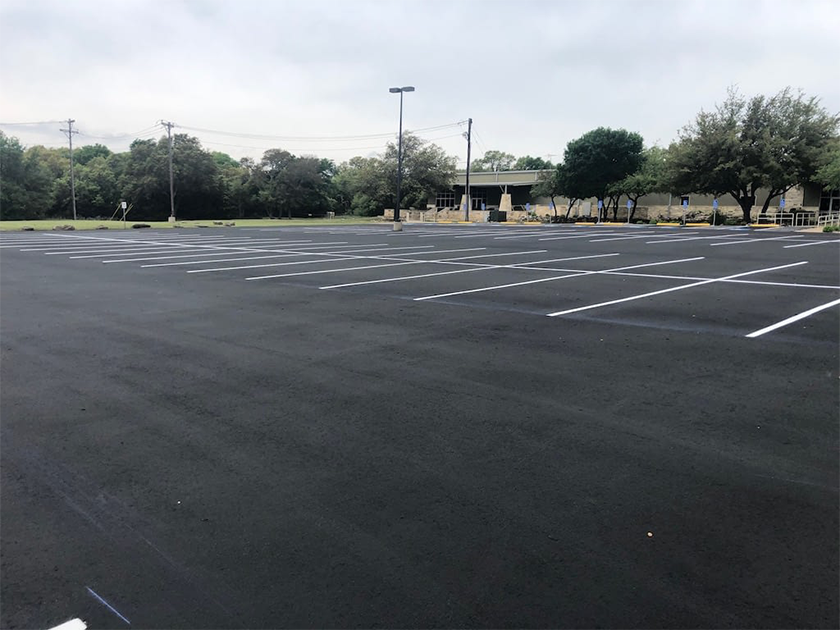Asphalt has become the leading paving material in North America. It is an economical and attractive solution that can last for decades if properly maintained. Virtually all Austin paving contractors recommend sealing asphalt pavement to maximize its longevity and enhance its appearance.
What Are The Pros and Cons of Sealcoating Your Asphalt Pavement?
What Is Sealcoating?
Manufacturers typically deliver asphalt emulsion sealing mixes to local contractors. The contractors then combine the mix, silica sand, water, and other additives if needed. The liquid sealcoat is then applied with a sprayer or squeegee. As it cures, the sealant forms a protective shell that is securely bonded to the pavement.
What Are the Pros of Applying a Sealcoat to Asphalt Pavement?
Asphalt sealants provide many benefits, including the potential to double the life of many pavements. Here are some of these benefits.
1. The sun emits ultraviolet radiation that can fade your pavement’s color to an unattractive, dingy gray or brown shade. Sealants restore the dark color that your pavement had when it was new.
2. The sun’s rays can also leave asphalt pavement dry and brittle, making it more susceptible to cracking and other damage. Sealants help the pavement retain the moisture it needs for flexibility.
3. Sealants help protect against damage from automotive fluids. Oil, transmission fluid, grease, gas, and other petrochemicals can react with the binder in your asphalt pavement, turning the pavement soft and crumbly. Sealants slow the rate at which automotive fluids will reach your pavement and inflict damage.
4. Sealants are economical, typically costing just a few cents per square foot. This is significantly less than the cost of installing an overlay or rebuilding the pavement.
What Are the Cons of Applying a Sealcoat to Asphalt Pavement?
There are virtually no negatives to sealing asphalt pavement. However, some people might consider the following as drawbacks.
1. Sealants are not permanent so that they will need periodic applications. The interval between applications will depend on your pavement’s specific needs, but parking lot sealcoat, for example, usually requires a fresh application every two or three years.
2. Sealants cannot be applied to a new pavement until the asphalt has cured sufficiently. Most asphalt contractors recommend sealing new pavements within 12 months. However, depending on factors specific to your installation, you may be able to sealcoat within 90 days.
3. Sealants will obscure any existing pavement striping and markings, so you will need to have your contractor apply fresh paint after sealing. In Central Texas, most parking lot striping needs to be refreshed about every two years, even without sealing, so this is not much of a drawback.
4. Sealants cannot be applied without repairing pavement damage. If cracks or potholes are present, the liquid sealant will simply flow into the opening and disappear. Many contractors offer parking lot maintenance programs that include pavement repairs, parking lot sealcoat, and striping and marking.
If you have questions about asphalt sealcoating, contact the experts at Alpha Paving for answers. We are a full-service, highly respected asphalt, and concrete contractor. Our services include sealcoating, parking lot striping and marking, asphalt paving and resurfacing, thermoplastic pavement markings, concrete installation and repair, asphalt milling, road construction, street, and parking lot maintenance, and speed bump installation. Our clients include health care facilities, municipalities, retailers, industrial facilities, apartment complexes, subdivisions and HOAs, shopping centers, airports, property management firms, hotels, religious institutions, and educational facilities. We are known for the outstanding quality of our work and our exemplary customer service. We offer free quotes, so call our Round Rock office at 512-677-9001 or fill out the online form to request yours today.




